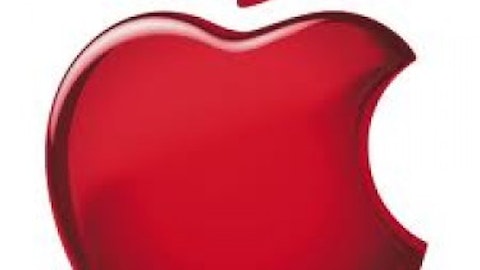In the past several months, write-ups on Apple Inc. (NASDAQ:AAPL) have been parsed over more intensely than some of our politicians’ speeches. This increased interest comes amid a widespread bearish outlook on the iPhone maker. The Silicon Valley gem, which was recently embroiled in a battle with authorities over tax payments, is currently caught in the thick of negative reports. In my opinion, the negative outlook is largely justified. Nonetheless, I just can’t shake off the feeling that perhaps Apple Inc. (NASDAQ:AAPL)’s case is widely misunderstood. There is a possibility that most of the analysts are myopic and that Apple is still on the rails as far as its end game is concerned.
Apple knows that smartphones will be a key technological pillar for a long time
Unlike most handset makers, Apple Inc. (NASDAQ:AAPL) saw the long-term future of smartphones and mobile devices. Smartphones and tablets will soon become a central pillar in technology, and before another wildly inventive breakthrough comes they will define almost everything we do.
Research In Motion Ltd (NASDAQ:BBRY)’s senior vice president of software, Sebastien Marineau-Mes, has rooted for the idea that cars will soon double as smartphones. Blackberry’s subsidiary QNX –where Mes comes from– is an active player in advancing infotainment operating systems for automobiles, commanding 60% of the market. Mes is therefore someone who would know what he’s talking about. He contends that a good number of vehicles will have built-in modems by 2017, suggesting that cars will soon feature smartphone capabilities.
Another key sign that smartphones are becoming increasingly essential was the huge number of smartphone sales that occurred at the onset of the year. For the first time ever, smartphone sales outstripped feature phone sales, constituting 51.6% of all mobile phone sales in the first three months of 2013. Furthermore, this trend is expected to hold moving forward. I personally believe that feature phones will soon go the way of the dodo, even in growth markets in Asia, Africa and Latin America.
Apple doesn’t want the whole pie, just the sweetest parts
In my opinion, one great misconception is the idea that Apple Inc. (NASDAQ:AAPL) is losing solely based on a thinning market share. That was bound to happen, and the company’s top executives were well prepared for it. Apple didn’t want the bulk of the market as many people would want to imagine–it just wanted the segments of the market that reward handsomely. This explains why it has been adamant on reducing its price points.
Once the smartphone market becomes fully defined, Apple Inc. (NASDAQ:AAPL)’s role will become clear. The handset maker wants to become the Porsche or Bugatti of the smartphone and tablet market. For Apple, the most important thing is maintaining the “cool” factor and presenting a premium brand to consumers. Although this approach has been met by heavy criticism, there is no denying that it’s ingenious. For every sale that Apple Inc. (NASDAQ:AAPL) makes, it will offset, say, ten sales that other mid-range handset makers make. Once everyone on the planet owns a smartphone and usage extends far beyond calls and Internet, there will be a surging need to associate with the best brands; brands that differ from the norm.
Facing the competition
Samsung’s momentum, albeit threatening, will ultimately play out. The South Korean handset maker announced record earnings for the first three months of the year, increasing its operating profit by 54%. However, it is important to note that Samsung’s flagship models, those that directly compete with the iPhone, account for less than half of its sales. Most of the sales for the company come from mid-range and low-range smartphones as well as a few feature phones. In addition, Google Inc (NASDAQ:GOOG) will continue pitching the Android operating system to upcoming handset makers in order to subtly reduce Samsung’s control of the ecosystem.
There are growing concerns within Google that Samsung is becoming too powerful, coming on the heels of increased pressure on Google to key out a viable monetization plan for Android. At the onset of the year, the WSJ reported that Google’s fears over Samsung were real. At the time, Google Inc (NASDAQ:GOOG) reportedly held an emergency meeting at the Mobile World Conference with Hewlett Packard, HTC and other Android phone makers to discuss Samsung’s overbearing dominance in Android. This followed reports that Samsung had accounted for close to 40% of 2012’s Android sales.
As these clandestine wars go on, Android’s 75% global market share will present less of a threat to Apple Inc. (NASDAQ:AAPL). As it increases, in fact, a segment of the market will pay anything to be different from everyone.
Perhaps the only real speed bump will be Research In Motion Ltd (NASDAQ:BBRY). Despite the negative outlook from the media, the Canadian tech bigwig is making notable inroads. It recently released the BlackBerry Enterprise Service version 10.1, allowing corporations to control iOS and Android devices from one Mobile Device Management system. This will be a great counter to the “Bring Your Own Device” concept that rattled Blackberry’s footing in enterprise.
Conclusion
The MacBook is perhaps the greatest testament to Apple Inc. (NASDAQ:AAPL)’s success as far as advancing premium products is concerned. Even with the stumbles in the PC sector, the MacBook still remains a top choice for tech lovers who have a knack for superior products that greatly differ from the norm. Apple’s stance in the smartphone market will ultimately pay off; the current stalemate is just a mere speed bump.
Lennox Yieke has no position in any stocks mentioned. The Motley Fool recommends Apple and Google. The Motley Fool owns shares of Apple and Google.
The article Apple’s Case Could Be Widely Misunderstood originally appeared on Fool.com and is written by Lennox Yieke.
Copyright © 1995 – 2013 The Motley Fool, LLC. All rights reserved. The Motley Fool has a disclosure policy.






